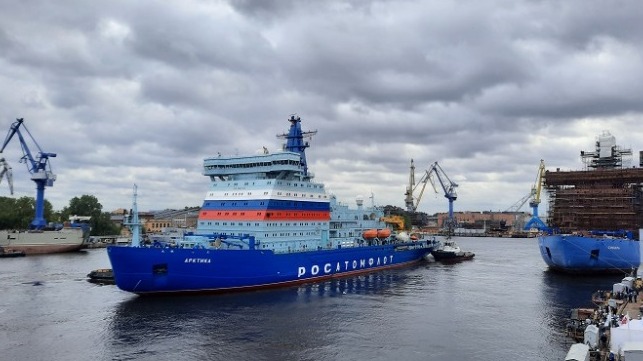Short of Capacity, Russia Turns to India and China for Ice-Class Ships

The Russian government is an enthusiastic advocate for its domestic shipbuilding industrial base, and often instructs private Russian operators to place orders with state-sponsored Russian yards. But facing a stark need for more icebreakers, and with domestic yards lagging badly, Russia is looking to shipbuilders in China and India for extra construction capacity.
Russian President Vladimir Putin has put a high priority on increasing traffic on Russia's Northern Sea Route (NSR), including development of year-round navigation. At present, the route handles about 35 million tonnes of cargo a year; Putin would like to increase that to 200 million tonnes by 2031.
In the route's frigid eastern stretch, wintertime transits require a heavy icebreaker escort to clear the way. But three of Rosatom's six nuclear-powered icebreakers will be aging out of service by 2027, according to deputy security council chairman Dmitry Medvedev. The NSR Directorate believes it will need at least seven to enable year-round navigation, and preferably 12-14.
"If they are not replaced in the near future with new vessels of modern designs . . . then by 2030 there is a risk of facing a shortage of icebreaking capacities,” Medvedev told Vedomosti last year.
For this reason, Russia - which has the world's largest icebreaker fleet - plans to build another 50 ice-capable vessels and icebreakers for the NSR by 2035. This is easier said than done, even under ideal circumstances, but the Russian shipbuilding industry is already struggling under a less technically complex task - building fishing vessels. Among other challenges, sanctions have cut down on the import of foreign-made equipment; the domestic supply chain for key components is severely restricted; and there is an ongoing shortage of skilled labor.

that matters most
Get the latest maritime news delivered to your inbox daily.
To resolve these challenges, the staunchly protectionist Russian government may have to turn to foreign builders. Negotiations are under way with India, which has not built an icebreaker before, and will soon begin with China. Chinese yards have delivered one heavy icebreaker and many ice-classed merchant vessels.
“Are there shipyards in such a number, are there specialists in such a number - this is probably just the topic where it is interesting to talk with our largest partners on the subject of cooperation," the head of the Ministry for the Development of the Russian Far East, Alexei Chekunkov, told RBK. “India is interested in working together to develop northern navigation and potentially in joint shipbuilding . . . Somewhere together we will be able to produce an ice-class fleet in sufficient quantities.”
